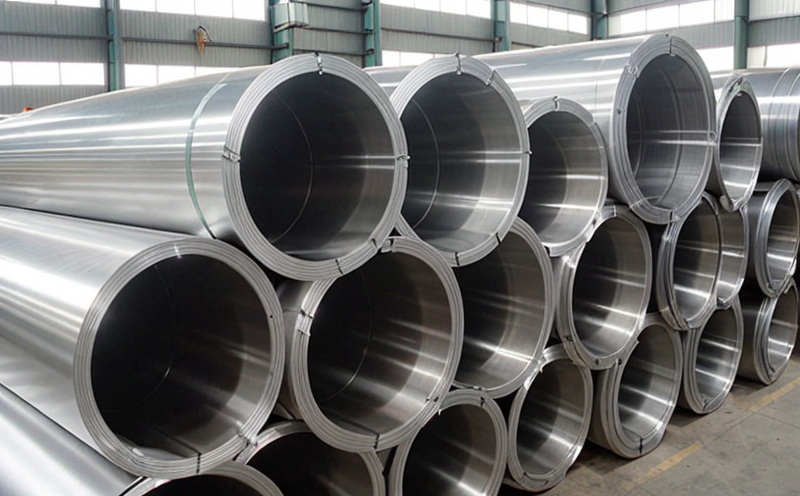ASTM D6577 Corrosion Resistance Testing of Offshore Equipment
The ASTM D6577 standard is designed to evaluate the corrosion resistance of aluminum materials that are intended for use in marine environments, particularly focusing on offshore equipment. This testing method provides a standardized approach to assess how effectively these materials can withstand exposure to saltwater and other corrosive elements characteristic of the maritime industry.
The test involves exposing specimens made from aluminum alloys commonly used in shipbuilding and related industries to controlled environmental conditions that simulate real-world exposure. The process typically includes immersion tests, salt spray testing, and sometimes cyclic loading tests depending on the specific requirements outlined by the ASTM D6577 protocol. Specimens are then visually inspected for signs of corrosion such as pitting, cracking, or changes in coloration.
Understanding the performance of aluminum materials under these conditions is crucial because even small amounts of corrosion can lead to significant structural failures and operational issues in offshore equipment. By adhering strictly to ASTM D6577 guidelines, manufacturers ensure that their products meet stringent quality standards necessary for reliability and longevity in harsh marine environments.
For instance, the testing procedure might involve immersing specimens in a saltwater solution at specific temperatures over prescribed periods while continuously monitoring any changes. This helps determine if the material will perform consistently under expected service conditions throughout its lifecycle. Compliance with such tests not only enhances product performance but also supports regulatory compliance requirements for various maritime operations.
The importance of this test cannot be overstated, especially considering that offshore equipment operates in challenging environments where exposure to seawater can accelerate degradation processes. By leveraging ASTM D6577 testing methods early in the design phase or during quality assurance checks, companies can identify potential weaknesses before they become critical defects leading to costly repairs or replacements.
In summary, ASTM D6577 corrosion resistance testing is a vital tool for ensuring that aluminum materials used in offshore equipment are capable of withstanding corrosive environments. It plays a key role in maintaining reliability and safety standards across the maritime sector by providing consistent quality assurance through rigorous evaluation techniques aligned with international standards.
Industry Applications
The ASTM D6577 corrosion resistance testing method finds extensive application within various sectors of the marine industry, particularly those involving offshore equipment. This includes but is not limited to:
- Shipbuilding: Ensuring that materials used in constructing ships can withstand saltwater exposure without degrading.
- Rig Construction: Evaluating the durability of components utilized in offshore drilling platforms against corrosive sea conditions.
- Submarine Manufacturing: Guaranteeing that submarine parts maintain their integrity during prolonged submersion in saltwater.
- Marine Structures: Testing structural elements for long-term stability and safety in coastal or oceanic structures.
By adhering to ASTM D6577, manufacturers can demonstrate compliance with industry best practices while enhancing their reputation as leaders in quality and reliability. This testing process also aids in meeting regulatory requirements set forth by organizations like the American Bureau of Shipping (ABS), Lloyd’s Register, and others.
Eurolab Advantages
At Eurolab, we pride ourselves on offering comprehensive services that cater specifically to the needs of our clients operating in demanding sectors such as marine & ship equipment testing. Our expertise lies not only in providing accurate and reliable test results but also in ensuring that these tests meet all relevant international standards including ASTM D6577.
Our state-of-the-art facilities are equipped with advanced instrumentation capable of simulating realistic environmental conditions for thorough evaluation of aluminum materials used in offshore equipment. This allows us to deliver precise, repeatable results every time. Our team of highly experienced professionals ensures that each test follows the exact protocols prescribed by ASTM D6577, thereby guaranteeing consistency and accuracy.
We understand that time-to-market is critical for businesses operating within competitive markets. Therefore, we strive to streamline our processes without compromising on quality or integrity. From initial consultation through final report delivery, our goal is to provide a seamless experience tailored specifically towards meeting your unique requirements.
Moreover, Eurolab offers additional value-added services such as consulting support during the early stages of product development and troubleshooting post-testing issues. These offerings further enhance our clients' overall satisfaction by ensuring that they receive comprehensive solutions beyond just basic testing capabilities.
Competitive Advantage and Market Impact
Earning certification through ASTM D6577 corrosion resistance testing offers several competitive advantages for companies involved in manufacturing aluminum materials intended for use in marine environments. Here are some key benefits:
- Enhanced Reputation: Demonstrating adherence to stringent international standards enhances brand reputation among customers and partners.
- Regulatory Compliance: Ensures compliance with local regulations, reducing risks associated with non-conformity penalties or market withdrawals.
- Increased Market Share: Differentiation based on superior quality materials can attract more customers seeking reliable products.
- Improved Customer Trust: Meeting stringent testing criteria builds trust with end-users who rely heavily on dependable performance from their suppliers.
The impact of achieving ASTM D6577 certification extends beyond individual organizations; it contributes positively towards fostering a robust and reliable supply chain within the marine sector. This collective effort ensures that all participants adhere to high standards, ultimately leading to safer operations at sea.





